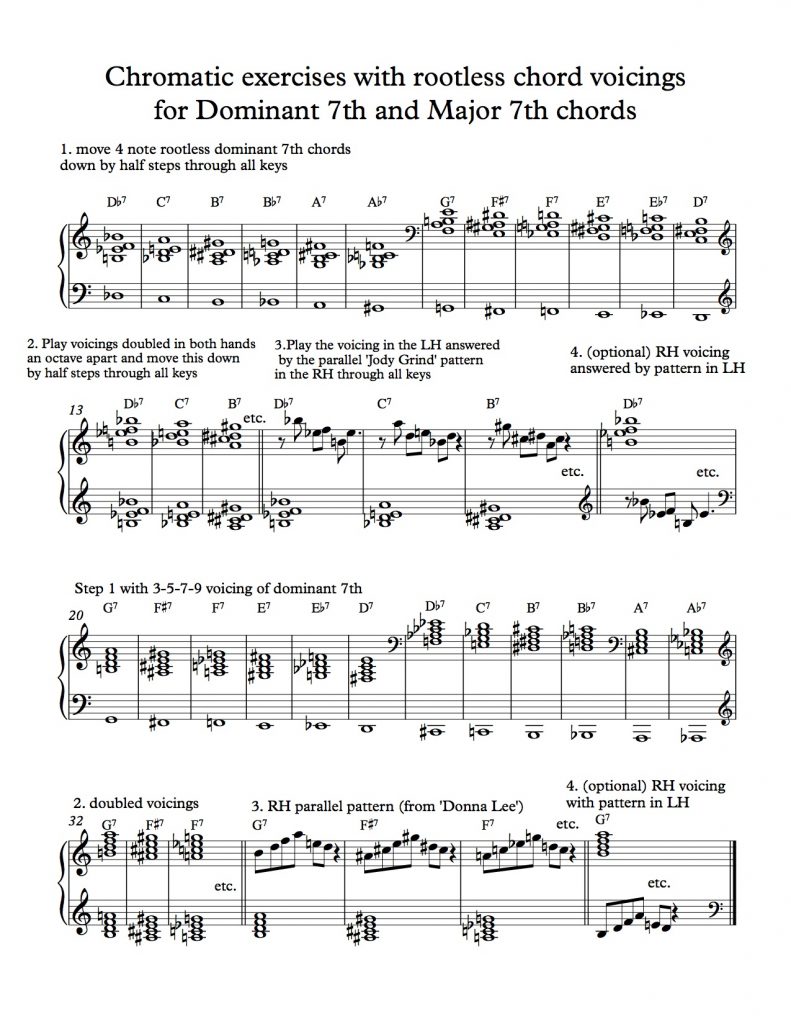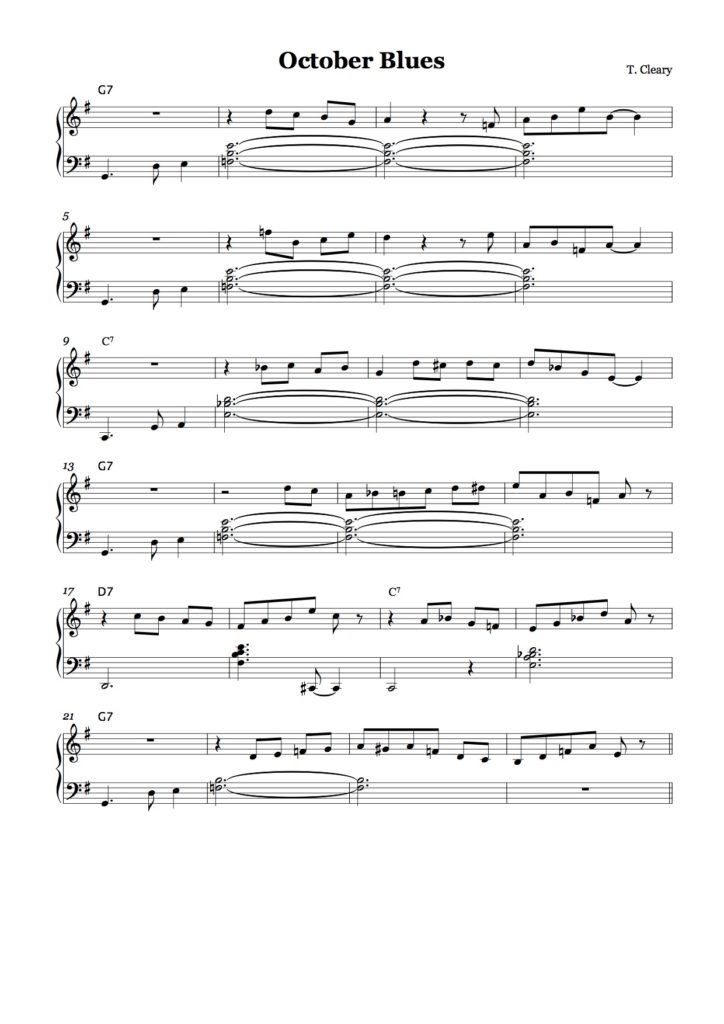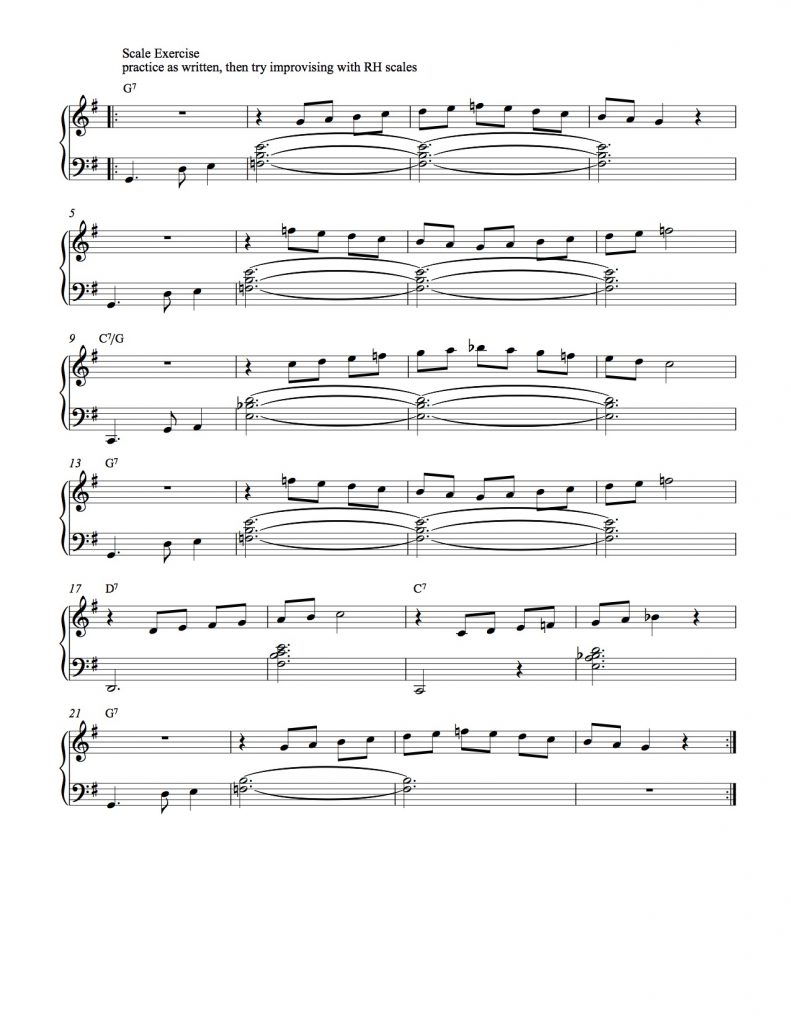An essential skill for all improvisers is being able to play the seventh scale (Barry Harris’ term for the major scale with a flatted seventh) through all twelve keys with steady tempo and a sense of swing. There are many patterns one can use to move through all keys; one of the most basic is the ‘circle of fifths’ (i.e. a pattern of descending fifths and/or ascending fourths.) Here is one way of practicing this sequence on the piano in a conversational style, with the left hand playing chordal ‘question’ phrases and the right hand answering with scales:
To help your ear make sense of the rootless guide-tone voicings in the left hand, try practicing the chords as written in the lower staff with your right and adding the roots in your left hand.
The 7-3-13 voicing of the dominant seventh chord can be heard the intro to the Benny Golson tune ‘Killer Joe’ (played by McCoy Tyner on the original recording) and the intro to ‘Hit That Jive Jack’ as played by Diana Krall on her recording of the tune (based on the Nat King Cole original.) On both of these intros the four-note version of the chord is used, with a 9th added between the 7th and the 3rd. The 3-7-9 voicing of the dominant seventh chord can be heard in the left hand of both Thelonious Monk’s intro to ‘Well You Needn’t’ on the version from the album Genius of Modern Music and Duke Ellington’s intro to ‘In A Mellow Tone’ on the version from the album The Blanton Webster Band.
The exercise below expands the three note voicings from the first exercise into four note voicings and guides you through practicing them in a number of ways: with left hand roots and right hand voicings, with rootless voicings doubled in both hands, and with one hand playing the rootless voicing while the other hand plays a pattern derived from it. The pattern based on the 7-3-13 voicing is from Horace Silver’s The Jody Grind, and the pattern based on the 3-7-9 voicing is from the bop tune ‘Donna Lee’ (on which Charlie Parker is usually credited as the composer, although Miles Davis claims to have written it.)
My tune ‘October Blues’ uses both of these patterns over a bassline inspired by Miles Davis’s ‘All Blues‘ and a G blues progression borrowed from the Lee Morgan tune ‘Calling Miss Khadija’. (Click on the highlighted title in the last sentence to hear my solo piano recording of the tune. It uses two more patterns based on rootless dominant voicings which can be found in my exercise ‘Jody, Donna, Ko-Ko and Four Brothers’ (and which come from the last two tunes referenced in my composite title, ‘Ko-ko’ by Charlie Parker and ‘Four Brothers’ by Jimmy Giuffre.) This exercise can be found in Part 2 of this post. Rather than using Davis’s continuous bassline, here I combine a two bar bass pattern with a rootless voicing to make a four bar phrase that leaves room for a right-hand melodic answer. You could begin your improvised solo by keeping the same left hand pattern and answering it with improvised fills in your right hand. You could also work your way over the course of an improvised solo toward a more continuous bassline ala ‘All Blues’. The scale outline below the tune illustrates one way of practicing seventh scales over a simpler left hand bassline to work your way toward improvising a melodic conversation between a repetitive and spacious left hand and a more active, improvised right hand. Try practicing the tune and the exercise first along with this slower three-chorus bass-and-drum playalong. Once you can play accurate chords, melody and scales at that tempo, try this faster four-chorus playalong. I hope you enjoy this tune!


Thank you for taking the time to add suggested fingerings to your exercises. I’m a self-taught pianist who didn’t have the good fortune of having scales drilled into me at an early age. Now I practice scales as much as I can, but sometimes jazz patterns can be difficult to work out and most jazz books don’t bother to offer suggested fingerings (“Fingerings are very personal, work these out on your own…” But gimme a place to start!)
Anyway, thank you – it’s very much appreciated.